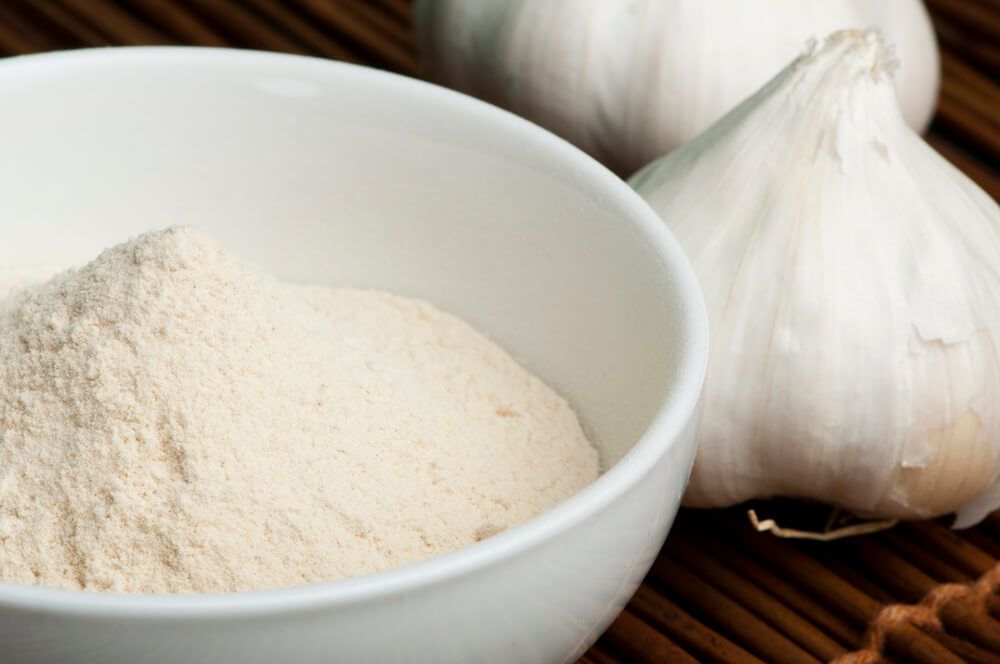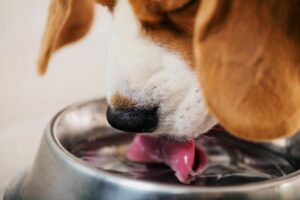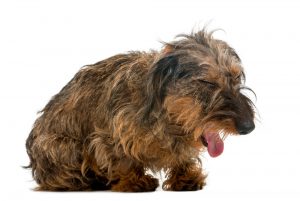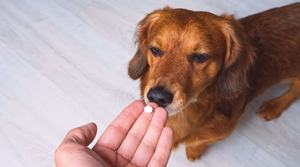
Reviewed & Fact-Checked by
Dr. Joanna Woodnutt
Veterinarian, MRCVS
Learn more about our Veterinary Review Board »
Most people take the assumption that if a food is safe for them to eat, it is also safe for their dog to eat. This is not at all true.
Some of the things we love are not good for our dogs. In fact, some of them are actually very toxic. Things like chocolate and grapes for example.
But, what about garlic powder? Can dogs eat garlic powder? We have the answer.
Is Garlic Bad for Dogs?
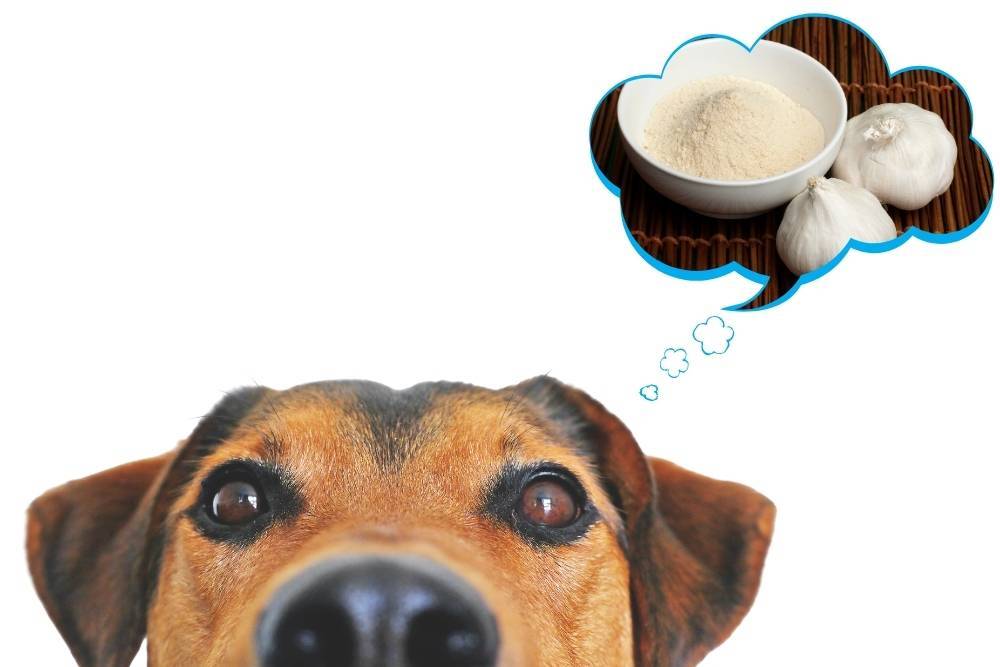
You should know that garlic is toxic for your dog.
Garlic (Allium sativum) is considered to be less toxic for dogs than onions, but it is still - poisonous. Like onions, garlic contains compounds that can cause hemolytic anemia, a potentially fatal condition.
A very small - study - that administered 5 g of whole garlic/kg once a day for 7 days, found that the bioactive compounds of garlic - in particular allicin - had the potential to oxidize red blood cell membranes. This oxidative damage stops the red blood cells from functioning properly.
It concluded that garlic can result in severe oxidative damage and ''thus, foods containing garlic should not be fed to dogs''.
Merck Veterinary Manual further concludes that, garlic while less damaging than onion contains a chemical called thiosulphate that can result in anemia.
The average supermarket clove weighs about 4-7 grams depending on garlic variety and size of bulb. A dog doesn't need to consume a large amount to get seriously sick.
Note that some dog breeds - including smaller breeds - and Japanese breeds of dogs (Akita, Japanese Spitz, Shiba Inu) are more sensitive to garlic toxicity than others. So even small amounts can be quite damaging to their health. The reason for that remains unclear.
It is best not to give your dog garlic and to take them your vet if you think they have eaten any amount of garlic, even if they show no symptoms.
What About Garlic Powder - Is Garlic Powder Bad for Dogs?
Garlic powder is dried garlic. Drying garlic does not make it safe for dogs, so garlic powder is still toxic to dogs.
Garlic powder is actually more dangerous for dogs than whole garlic - because it has been dried, it weighs less, meaning it takes far less garlic powder to cause problems than it would do whole cloves of garlic!
Also note that garlic powder (powder form) is more potent than granulated garlic (coarser).
1 clove of garlic = 1/4 teaspoon powdered garlic.
How Much Garlic Powder Can a Dog Eat?
None at all!
Because garlic powder is so potent, it takes very small amounts of garlic powder to cause illness in a dog.
As shown in the study above, 5g of garlic per kilo of bodyweight per day can cause red blood cell damage. So, as little as a quarter teaspoon of powdered garlic per kilo per day is likely to cause illness in a dog.
But that doesn't make smaller quantities safe. Some dogs are considerably more sensitive than others. Other dietary factors, medical conditions, or breed can make the difference to how toxic garlic powder is for dogs. So why would you take the risk with your pooch?
So, Why Is There Garlic Powder in Dog Treats?
Great question. Some treats and foods contain tiny amounts of garlic powder. And here’s the paradox:
Some vets and dog nutritionists think that very small quantities of garlic powder can actually be beneficial to your dog.
The theory is that a small amount of garlic can ward off worms and other parasites and even help with fleas. However, there is absolutely no evidence currently that this is the case.
So it’s fair to say that the jury is still out on this one.
While it could be a good conversation to have with your vet, you may decide to go with caution and simply avoid garlic in all its forms completely.
Is Garlic Salt Bad for Dogs?
The short answer is - yes!
It contains both garlic and salt.
Salty foods in general should also be avoided since they can lead to dehydration in your dog and sodium ion poisoning.
While a small amount of salt in a dog's diet can be safe, even as little as 1.5 grams of salt per pound of body weight can be lethal to them.
Some owners wonder if dogs can eat garlic bread or cheesy garlic bread as the amount of garlic may be minimal. The answer is no, these products still contain toxins!
Help! My Dog Ate Garlic Powder. What do I do?

While garlic has one of those smells that instantly makes us want to eat food, is used in cooking just about anywhere in the world and may even have certain health benefits, the same does not hold true for your dog. If your dog has tucked into your food containing garlic powder, read on.
The first thing you need to do is not to panic. Garlic is a cumulative toxin, meaning small amounts can be dangerous over time. But if your dog has just got into your dinner as a one-off, he can get away with eating a bit more. However, it's still important to act.
Even though small amounts of garlic powder won't be fatal, they are likely to upset his tummy and you will find yourself dealing with vomiting and diarrhea.
If you're afraid that your dog has eaten garlic powder or nibbled on a garlic clove by accident, you should take him to your veterinarian or call Pet Poison Helpline immediately.
Let them know your dog's size and how much garlic you think he ate, as well as any other potential toxins, like onions, that might be present. They will give you further advice and help you determine whether treatment is needed.
What are the Symptoms of Garlic Poisoning in Dogs?
Take note, some of these signs may also not be apparent in some dogs for a few days which is why it's key you take action even if they aren't showing symptoms.
- Vomiting
- Diarrhea
- Panting and restlessness
- Lethargy
- Tail tucking
- Elevated heart rate
- Pale gums
- Increased respiratory rate
- Drooling
- Seizures
- Abdominal tenderness and cramping
- Exercise intolerance
- Collapse
Your pet's reaction to any form of garlic that's ingested will vary based on the breed, size of dog, amount of garlic eaten and their own personal health history.
Take Note
If your dog has ingested garlic and is showing signs of garlic toxicity seeking immediate emergency care is essential! Contact your closest animal emergency center for advice and to let them know you are on your way.
Treating Toxicity Caused By Garlic and Garlic Powder
If your dog has not vomited, your vet may well cause him to do so just to get the remaining spices out of his gastrointestinal tract. This can stop the garlic being absorbed but does not need to be done in the first few hours after ingestion.
Your vet may also use activated charcoal to act as a decontaminant. This binds the toxin and prevents it from being absorbed.
Once the toxin has been absorbed, the question is how much damage it is going to do. Repeated blood tests can show the extent of the damage. If there is damage, your vet may have to administer IV fluids and medications, put your pet in an oxygen tent, or even do a blood transfusion.
Other Similar Foods That Are Harmful to Pets
There are other foods in the garlic family that you might find in the kitchen. While sizzling away on the stove they may be enticing to your dog, but they are in fact toxic, potentially lethal, and can cause severe digestion problems for your dog.
They are:
- Onions
- Chives
- Shallots
- Leeks
- Scallions
If you suspect that your dog might have ingested any of these ingredients, contact your veterinarian immediately.
The simplest way to avoid poisoning your dog is clear. Keep him away from herbs and store your garlic in an area your dog cannot reach it.
If you suspect your dog has eaten garlic (in any form - dried, powdered, raw, cooked or liquid) contact your vet immediately or Pet Poison Helpline at (855) 764-7661.

